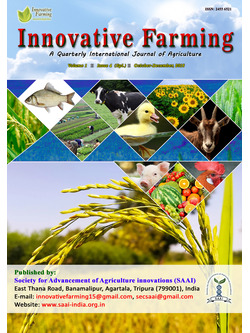
Constraints and Prospects of Traditional Pig Husbandry for Tribal Livelihood in Jharkhand
Satish Kumar*
GVT-Krishi Vigyan Kendra, Godda, Jharkhand-814133, INDIA
Ritesh Dube
GVT-Krishi Vigyan Kendra, Godda, Jharkhand-814133, INDIA
Neeraj
Sundaresan School of Animal Husbandry and Dairying, SHIATS, Uttar Pradesh-211007, INDIA
DOI: NIL
Keywords: Pig farming, Livelihood, Socio-economic
Abstract
In India there is tremendous increase in pig farming due to high demand of animal product for human consumption. A study has been undertaken to appraise the in depth scenario of traditional pig production systems and to identify the problems where scientific intervention would be initiated for further improvement in production. Survey was conducted with designed questionnaire in selected villages of five different districts of Jharkhand. A total of 400 respondents were interviewed on different aspects of socio–economic status, routine management, health care practices and market linkage associated with pig husbandry. Majority of pig farmers belongs to lower income group, small and medium land holding capacity, low educational level with average family size of 4 to 10 members, small scale low input pig farming at intensive system prevails in Jharkhand. The major constraints included high cost of concentrate feed (90.28%), non-availability of medicine vaccine and veterinary health care (86.67%), high cost of initial investment in housing and piglets procurements (73.56%), frequent disease outbreak and mortality of piglets and adult stock (48.89%), lack of availability of good breeding boar (49.27%), availability of market linkage (54.46%), etc. Scientific interventions in utilization of non-conventional feed resources, capacity building, market linkage for inputs and pig produce, extension of health care services, making availability of quality pig germplasm, making availability of quality feed ingredients and insure availability to improved crossbred piglets at village level could transform the traditional pig farming to a profitable enterprises.
Downloads
not found
Reference
Epprecht, M. 2005. Geographic Dimensions of Livestock Holdings in Vietnam. Spatial relationships among poverty, infrastructure and the environment. PPLPI Working Paper, Vol. 24. FAO, Rome, Italy.
Kumar, S., Prasad, N., Thakur, S., & Singh, S. K. 2008. Effect of higher levels of zinc on utilization and mineral balance in indigenous pigs. Animal Nutrition and Feed Technology, 8: 285–288.
Kumaresan, A., Bujarbaruah, K. M., Pathak, K. A., Das, A., & Bardoloi, R. K. 2009. Integrated resource-driven pig production systems in a mountainous area of North East India: production practices and pig performance. Tropical Animal Health and Production, 41: 1187–1196.
Lanada, E. B., Lee, J. A., More, S. J., Basito, S., & Taveros, A. 2005. A longitudinal study of sows and boars raised by smallholder farmers in the Philippines. Preventive Veterinary Medicine, 70: 95–113.
Lemke, U., Kaufmann, B., Thuy, L. T., Emrich, K., & Zarate, A. V. 2006. Evaluation of smallholder pig production system in North Vietnam. Agricultural Systems, 96: 207–223.
Moanaro, E., Ngullie, I., Walling, I., Krose, M., & Bhatt, B. P. 2011. Traditional Animal Husbandry Practices in Tribal States of Eastern Himalaya, India: A Case Study. Indian Journal of Animal Nutrition, 28: 23–28.
Mpofu, I., & Makuza, S. M. M. 2003. Pig Production Science and Technology, 1st edition, Ed A. Shonhiwa, Upfront Publishing, UK.
Patr, M. K., Begum, S., & Deka, B. C. 2014. Problems and Prospects of Traditional Pig Farming for Tribal Livelihood in Nagaland. Indian Research Journal of Extension Education, 14: 4.
Petrus, N. P., Mpofu, I., Schneider, B. M., & Nepembe, M. 2011. The Constraints and potentials of pig production among communal farmers in Etayi Constituency of Namibia. Livestock Research for Rural Development, 23: 159.
